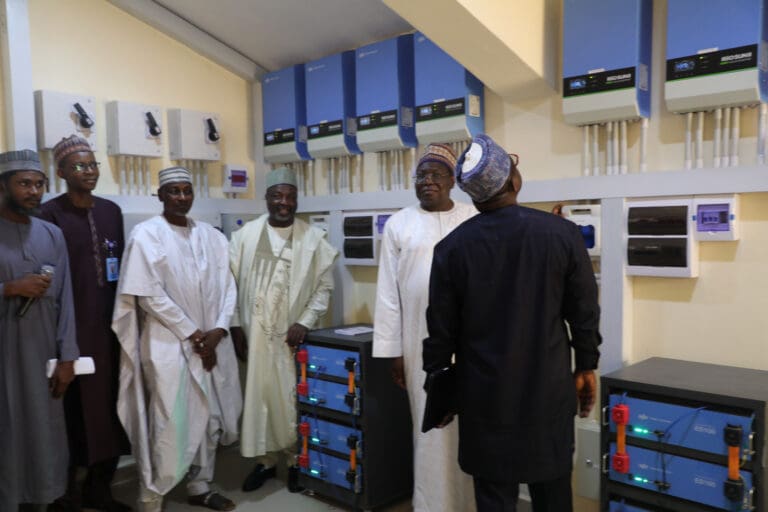In a bid to further improve sustainable energy access in West Africa, a solar photovoltaic installation was officially inaugurated on 31st of May 2024 at the Department of Chemical and Petroleum Engineering at Bayero University in Kano, Nigeria.
The solar installation, with a total capacity of 79kwp of solar PV, 58kw of inverter, and 60KWH of battery storage, was made possible with the financial support of the ECOWAS Commission through the ECOWAS Special Intervention Fund (ESIF), which is being implemented by the ECOWAS Centre for Renewable Energy & Energy Efficiency (ECREEE). The project aims to provide stable clean, affordable, and sustainable electricity to the Department and the University community at large.
The solar facility was formally inaugurated in the presence of Sediko Douka, ECOWAS Commissioner in charge of Infrastructure, Energy and Digitalisation; Professor Nazifi Abdullahi Darma, ECOWAS Commissioner in charge of Internal Affairs, Professor Mohamed Sani Gumel, Deputy Vice Chancellor of the Bayero University, who represented the Vice Chancellor of the University, Professor Sagir Adamu Abbas, and Engr. Samuel Bem Ayangeaor, Assistant Director, Renewable and Rural Power Access Department, who represented the Honourable Minister of Power of Nigeria.
Speaking at the event, Mohamed Sani Gumel, Deputy Vice Chancellor of the Bayero University, expressed gratitude to ECREEE for the grant award which made the project possible, noting that the project is a testament of what can be achieved through collaboration and shared vision.
Professor Gumel noted that the project symbolizes innovation, sustainability, and progress, which will not only provide reliable and sustainable energy supply, but also enhance the University’s capacity for research and education in renewable energy technologies.
Sediko Douka, ECOWAS Commissioner in charge of Infrastructure, Energy and Digitalisation, on behalf of the President of the ECOWAS Commission, expressed optimism that the solar project will have positive impact for the University community and serve as a model for clean energy development for other educational institutions in Nigeria.
He also commended the Department of Chemical and Petroleum Engineering, Bayero University for assuming responsibility for the management, operations, and maintenance of the solar facility, which he noted, will ensure its sustainability through proper operations and timely maintenance.
Professor Nazifi Abdullahi Darma, ECOWAS Commissioner for Internal Services, commended the University for pursuing the goal of access to a cleaner, cheaper, and more reliable source of electricity. He expressed confidence that the knowledge gained from the project will help build capabilities of the department to better manage such systems and pave the way for greater adoption of renewable energy technologies to meet growing energy demand.
He noted that as part of these efforts, the ECOWAS Commission is currently supporting the establishment of the $75 million ECOWAS Renewable Energy and Energy Efficiency Facility (EREEEF), which will provide grants and loans to sustainable energy projects across the ECOWAS region.
Engr. Samuel Bem Ayangeaor, Assistant Director, Renewable and Rural Power Access Department, who represented the Honourable Minister of Power of Nigeria, commended the ECOWAS Commission and ECREEE for the initiative to deploy sustainable off-grid renewable energy and energy efficiency technologies in West Africa and appreciate them for approving the grant to Bayero University, Kano.
He noted that the project is another contribution towards the achievement of Nigeria’s Energy Access targets, the Nationally Determined Contributions (NDC) in accordance with the Paris Agreement and the Energy Transition Plan (ETP) for the Net Zero carbon emissions by 2060. Engr. Ayangeaor added that the Federal Ministry of Power, in recognition of importance of providing the educational sector with sustainable and reliable electricity access, initiated the Energizing Education Project (EEP), which has benefitted several tertiary institutions in Nigeria.
The statement by the ECOWAS Commission stated that the ECOWAS Special Intervention Fund (ESIF) is financed by the ECOWAS Commission and implemented by the ECOWAS Centre for Renewable Energy and Energy Efficiency (ECREEE) based in Praia, Cabo Verde.
The Fund provides non-reimbursable co-funding grant for the capital expenditure in clean energy solutions in rural and peri-urban areas, with a specific attention to those initiatives supporting and promoting productive uses of electricity (PUE).
Similar projects are being implemented by ECREEE in the other ECOWAS Member States.
GIK/APA


